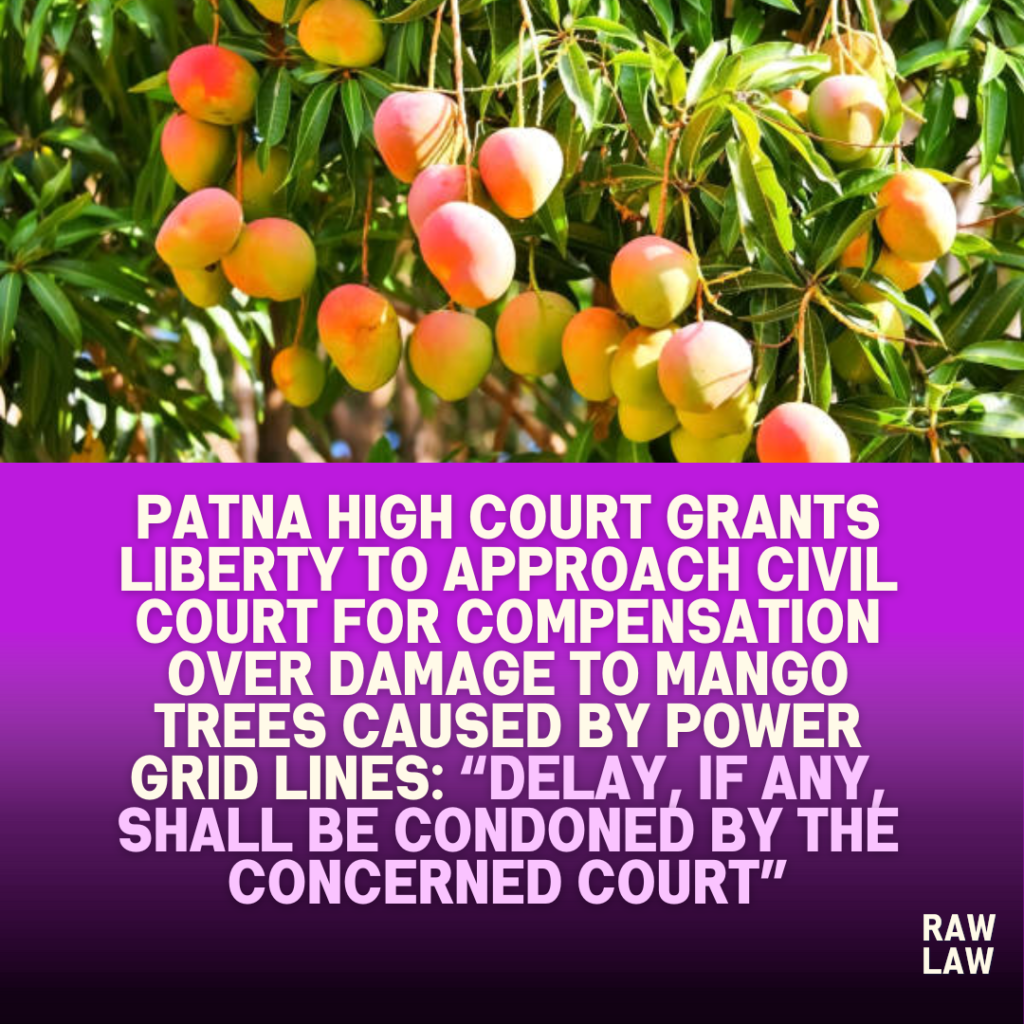Court’s Decision
The Patna High Court disposed of a writ petition seeking compensation for economic losses allegedly caused by the Power Grid Corporation of India due to damage to mango and other trees under a high-voltage transmission line. The Court declined to issue a mandamus for direct compensation but granted the petitioner liberty to file an appropriate civil suit. It directed that if such a petition is filed within four weeks, it shall be entertained on merits, and any delay in filing shall be condoned. The Court also disposed of any pending interlocutory applications.
Facts
The petitioner claimed substantial economic loss caused by the extension of a power transmission line by the Power Grid Corporation of India. According to the petitioner, this led to destruction of matured mango trees and other vegetation on his land, affecting recurring annual income from standing crops. Though a compensation amount of ₹1,43,467 had been transferred via NEFT in December 2017, the petitioner sought higher and more appropriate compensation reflecting current market values. He alleged that despite receiving a “Yellow Receipt” acknowledging tree damage, full and fair compensation had not been paid.
Issues
- Whether the petitioner was entitled to further compensation despite prior payment.
- Whether the Court could direct the Power Grid Corporation to pay enhanced compensation.
- Whether the petitioner had an alternate remedy available under the law.
Petitioner’s Arguments
The petitioner argued that:
- The compensation already paid did not reflect the real economic loss suffered.
- The damage to his mango trees and land under the high-tension lines had led to recurring annual losses.
- Despite acknowledgment via a Yellow Receipt, the authorities failed to properly assess or pay the due amount.
- He sought directions to reassess and disburse compensation based on prevailing market rates and to prevent further harassment.
Respondent’s Arguments
The Power Grid Corporation submitted that:
- The compensation amount of ₹1,43,467 was already paid to the petitioner via NEFT on 07.12.2017, thus addressing his grievance.
- The issue was squarely covered by the judgment in CWJC No. 17625 of 2016 (Lalmuni Devi v. State of Bihar & Ors.), which in turn relied on the Supreme Court decision in Power Grid Corporation of India Ltd. v. Century Textiles & Industries Ltd. & Ors., (2017) 5 SCC 143.
- Accordingly, the petition should be disposed of in the same terms with liberty to the petitioner to seek appropriate remedy before the competent civil court.
Analysis of the Law
The Court noted that the petitioner’s grievance, in essence, pertained to inadequacy of compensation. Citing the previous ruling in Lalmuni Devi, which was based on the Supreme Court’s pronouncement in Power Grid Corporation, the Court acknowledged that the petitioner’s claim did not warrant a writ of mandamus. Instead, the Court held that such disputes over adequacy of compensation and entitlement to enhanced amounts were triable before a civil court.
Precedent Analysis
The following precedents were referred to:
- Power Grid Corporation of India Ltd. v. Century Textiles & Industries Ltd. & Ors., (2017) 5 SCC 143
➤ Held that compensation claims arising from Right of Way or tower line extension must be adjudicated by competent civil courts unless otherwise expressly provided. - CWJC No. 17625 of 2016 (Lalmuni Devi v. State of Bihar & Ors.)
➤ The Patna High Court had disposed of a similar matter by directing the petitioner to seek compensation through civil court proceedings, referencing the above Supreme Court ruling.
These cases directly influenced the outcome, demonstrating judicial consistency in matters relating to compensation for Right of Way disputes.
Court’s Reasoning
The Court considered the prior payment and the similarity of the present case with the Lalmuni Devi ruling. It determined that no further direction was warranted under its writ jurisdiction but protected the petitioner’s right to seek compensation through civil court mechanisms. It clarified:
“If any such petition is filed within a period of four weeks from the date of receipt of copy of this order, the same shall be examined and considered on merits… The delay, if any, shall be condoned by the concerned Court.”
Conclusion
The writ petition was disposed of with the following directions:
- The petitioner may approach the appropriate civil court for compensation.
- If filed within four weeks of receipt of the order, such petition shall be heard on merits.
- Delay in filing shall be condoned by the court.
- Interlocutory applications, if any, were also disposed of.
Implications
- Reinforces the principle that adequacy of compensation must be contested before civil courts.
- Prevents forum shopping in writ courts for monetary claims without statutory basis.
- Protects litigants from procedural delay by directing condonation of delay in appropriate circumstances.
FAQs
Q1. Can a High Court under writ jurisdiction order compensation for tree damage caused by Power Grid projects?
No. If compensation has been paid, any further disputes must be raised before a civil court.
Q2. What if a compensation amount is inadequate or does not reflect market value?
The aggrieved party must file a civil suit seeking reassessment and enhanced compensation.
Q3. Is delay in filing such civil suits condonable?
Yes. As per this judgment, if filed within four weeks of the order, the civil court must consider the matter on merits and condone the delay.



